27届韩素音翻译大赛
韩素音青翻译奖赛中文原文及参考译文和解析
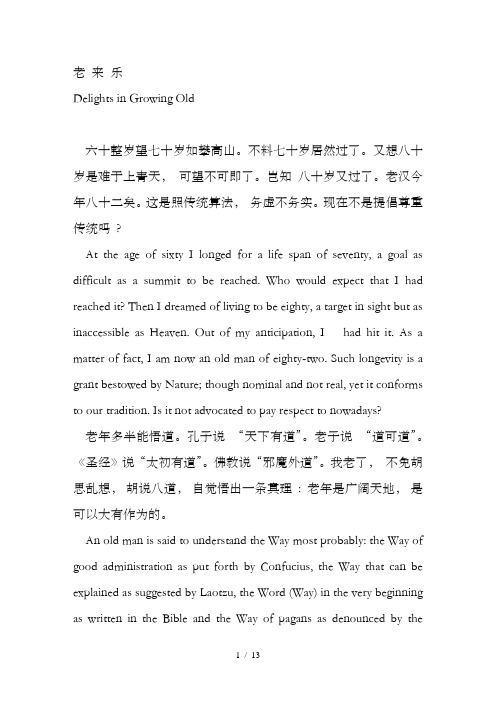
老来乐Delights in Growing Old六十整岁望七十岁如攀高山。
不料七十岁居然过了。
又想八十岁是难于上青天,可望不可即了。
岂知八十岁又过了。
老汉今年八十二矣。
这是照传统算法,务虚不务实。
现在不是提倡尊重传统吗?At the age of sixty I longed for a life span of seventy, a goal as difficult as a summit to be reached. Who would expect that I had reached it? Then I dreamed of living to be eighty, a target in sight but as inaccessible as Heaven. Out of my anticipation, I had hit it. As a matter of fact, I am now an old man of eighty-two. Such longevity is a grant bestowed by Nature; though nominal and not real, yet it conforms to our tradition. Is it not advocated to pay respect to nowadays?老年多半能悟道。
孔子说“天下有道”。
老子说“道可道”。
《圣经》说“太初有道”。
佛教说“邪魔外道”。
我老了,不免胡思乱想,胡说八道,自觉悟出一条真理: 老年是广阔天地,是可以大有作为的。
An old man is said to understand the Way most probably: the Way of good administration as put forth by Confucius, the Way that can be explained as suggested by Laotzu, the Word (Way) in the very beginning as written in the Bible and the Way of pagans as denounced by theBuddhists. As I am growing old, I can't help being given to flights of fancy and having my own Way of creating stories. However I have come to realize the truth: my old age serves as a vast world in which I can still have my talents employed fully and developed completely.七十岁开始可以诸事不做而拿退休金,不愁没有一碗饭吃,自由自在,自得其乐。
韩素音翻译大赛beyond life曹明伦中译版本归化策略赏析

韩素音翻译大赛beyond life曹明伦中译版本归化策略赏析韩素音翻译大赛的BeyondLife曹明伦中译版本是一部出色的文
本翻译作品,也是本次翻译大赛中表现卓越的文本翻译作品之一。
曹明伦出色的文本翻译最终决定了他在本次比赛中获胜,他所采用的归化策略也是值得学习之处。
首先,曹明伦在翻译Beyond Life充分考虑了传统文化层面,他认为一般的文本翻译无法完全贴近原作,应该依据不同的文化背景考虑翻译的文本结构、语言词汇选择和表达方式。
因此,曹明伦在每一句翻译时都尽量把文本的原意充分表达出来,而不是迎合某一种语言文化。
他也在翻译文章时充分考虑了当代语言文化中的一些特殊动态,如换用一些更受欢迎的词汇,以及增添一些当代文化内容,这样翻译出来的文本才能更具有可读性。
其次,曹明伦在翻译文本时也考虑到读者的感受,他认为读者对每一段的理解和接受程度至关重要,因此他在每一段的翻译中始终着重强调结构和表达上的巧妙,以使读者能够准确的理解文本的内容。
此外,他还在句子的结构和表达上制造出一定的张力和情感,以便读者能更好的体验文本带来的乐趣和感受。
同时,曹明伦还注重翻译文本的语言准确性,他坚持在翻译中尽可能保持原文的内容,但又不会让原文太过直接,他会通过一些词汇的变化来使翻译的文本更加流畅,表达也更加精准。
总之,曹明伦翻译Beyond Life的成功归功于他在翻译过程中所采用的传统文化、当代文化、读者体验和语言准确性等策略,他通过
这些策略,使得原文的意义不仅表达清晰,而且具有一定的文化熏陶和深度,获得了翻译大赛的金奖。
因此,翻译工作者在进行文本翻译时,也应当借鉴曹明伦的翻译策略,以更为完美地表达原文的内容和意义。
韩素音翻译大赛详解
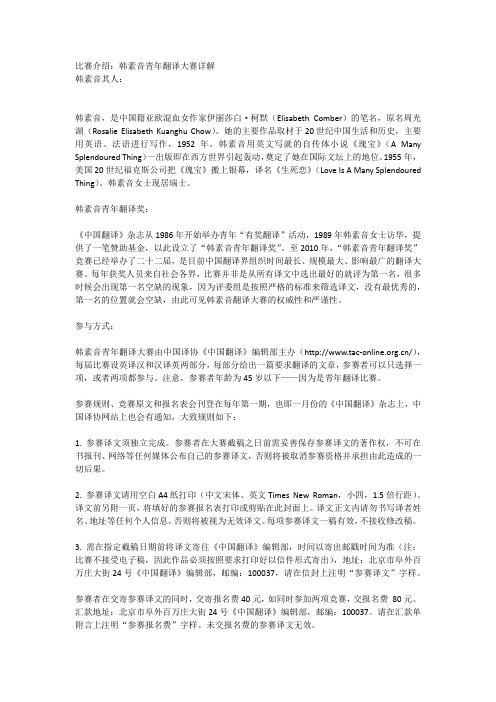
比赛介绍:韩素音青年翻译大赛详解韩素音其人:韩素音,是中国籍亚欧混血女作家伊丽莎白·柯默(Elisabeth Comber)的笔名,原名周光湖(Rosalie Elisabeth Kuanghu Chow)。
她的主要作品取材于20世纪中国生活和历史,主要用英语、法语进行写作,1952年,韩素音用英文写就的自传体小说《瑰宝》(A Many Splendoured Thing)一出版即在西方世界引起轰动,奠定了她在国际文坛上的地位。
1955年,美国20世纪福克斯公司把《瑰宝》搬上银幕,译名《生死恋》(Love Is A Many Splendoured Thing)。
韩素音女士现居瑞士。
韩素音青年翻译奖:《中国翻译》杂志从1986年开始举办青年“有奖翻译”活动,1989年韩素音女士访华,提供了一笔赞助基金,以此设立了“韩素音青年翻译奖”。
至2010年,“韩素音青年翻译奖”竞赛已经举办了二十二届,是目前中国翻译界组织时间最长、规模最大、影响最广的翻译大赛。
每年获奖人员来自社会各界,比赛并非是从所有译文中选出最好的就评为第一名,很多时候会出现第一名空缺的现象,因为评委组是按照严格的标准来筛选译文,没有最优秀的,第一名的位置就会空缺,由此可见韩素音翻译大赛的权威性和严谨性。
参与方式:韩素音青年翻译大赛由中国译协《中国翻译》编辑部主办(/),每届比赛设英译汉和汉译英两部分,每部分给出一篇要求翻译的文章,参赛者可以只选择一项,或者两项都参与。
注意,参赛者年龄为45岁以下——因为是青年翻译比赛。
参赛规则、竞赛原文和报名表会刊登在每年第一期,也即一月份的《中国翻译》杂志上,中国译协网站上也会有通知,大致规则如下:1. 参赛译文须独立完成。
参赛者在大赛截稿之日前需妥善保存参赛译文的著作权,不可在书报刊、网络等任何媒体公布自己的参赛译文,否则将被取消参赛资格并承担由此造成的一切后果。
2. 参赛译文请用空白A4纸打印(中文宋体、英文Times New Roman,小四,1.5倍行距)。
第二十七届韩素音青年翻译比赛汉译英优秀奖的译文教学内容
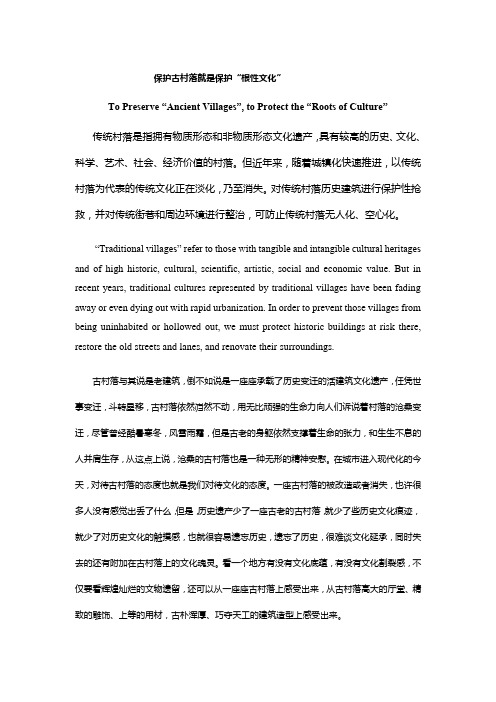
保护古村落就是保护“根性文化”To Preserve “Ancient Villages”, to Protect the “Roots of Culture”传统村落是指拥有物质形态和非物质形态文化遗产,具有较高的历史、文化、科学、艺术、社会、经济价值的村落。
但近年来,随着城镇化快速推进,以传统村落为代表的传统文化正在淡化,乃至消失。
对传统村落历史建筑进行保护性抢救,并对传统街巷和周边环境进行整治,可防止传统村落无人化、空心化。
“Traditional villages” refer to those with tangible and intangible cultural heritages and of high historic, cultural, scientific, artistic, social and economic value. But in recent years, traditional cultures represented by traditional villages have been fading away or even dying out with rapid urbanization. In order to prevent those villages from being uninhabited or hollowed out, we must protect historic buildings at risk there, restore the old streets and lanes, and renovate their surroundings.古村落与其说是老建筑,倒不如说是一座座承载了历史变迁的活建筑文化遗产,任凭世事变迁,斗转星移,古村落依然岿然不动,用无比顽强的生命力向人们诉说着村落的沧桑变迁,尽管曾经酷暑寒冬,风雪雨霜,但是古老的身躯依然支撑着生命的张力,和生生不息的人并肩生存,从这点上说,沧桑的古村落也是一种无形的精神安慰。
历届韩素音翻译大奖赛竞赛原文及译文详解
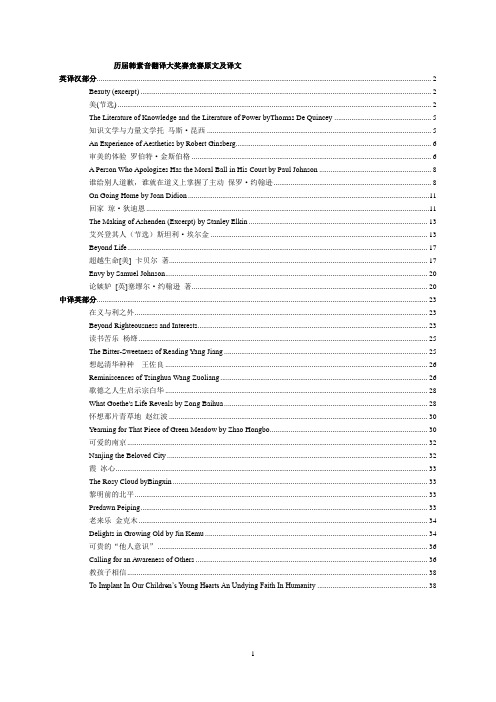
历届韩素音翻译大奖赛竞赛原文及译文英译汉部分 (2)Beauty (excerpt) (2)美(节选) (2)The Literature of Knowledge and the Literature of Power byThomas De Quincey (5)知识文学与力量文学托马斯.昆西 (5)An Experience of Aesthetics by Robert Ginsberg (6)审美的体验罗伯特.金斯伯格 (6)A Person Who Apologizes Has the Moral Ball in His Court by Paul Johnson (8)谁给别人道歉,谁就在道义上掌握了主动保罗.约翰逊 (8)On Going Home by Joan Didion (11)回家琼.狄迪恩 (11)The Making of Ashenden (Excerpt) by Stanley Elkin (13)艾兴登其人(节选)斯坦利.埃尔金 (13)Beyond Life (17)超越生命[美] 卡贝尔著 (17)Envy by Samuel Johnson (20)论嫉妒[英]塞缪尔.约翰逊著 (20)中译英部分 (23)在义与利之外 (23)Beyond Righteousness and Interests (23)读书苦乐杨绛 (25)The Bitter-Sweetness of Reading Yang Jiang (25)想起清华种种王佐良 (26)Reminiscences of Tsinghua Wang Zuoliang (26)歌德之人生启示宗白华 (28)What Goethe's Life Reveals by Zong Baihua (28)怀想那片青草地赵红波 (30)Yearning for That Piece of Green Meadow by Zhao Hongbo (30)可爱的南京 (32)Nanjing the Beloved City (32)霞冰心 (33)The Rosy Cloud byBingxin (33)黎明前的北平 (33)Predawn Peiping (33)老来乐金克木 (34)Delights in Growing Old by Jin Kemu (34)可贵的“他人意识” (36)Calling for an Awareness of Others (36)教孩子相信 (38)To Implant In Our Children’s Young Hearts An Undying Faith In Humanity (38)英译汉部分Beauty (excerpt)美(节选)Judging from the scientists I know, including Eva and Ruth, and those whom I've read about, you can't pursue the laws of nature very long without bumping撞倒; 冲撞into beauty. “I don't know if it's the same beauty you see in the sunset,”a friend tells me, “but it feels the same.”This friend is a physicist, who has spent a long career deciphering破译(密码), 辨认(潦草字迹) what must be happening in the interior of stars. He recalls for me this thrill on grasping for the first time Dirac's⑴equations describing quantum mechanics, or those o f Einstein describing relativity. “They're so beautiful,” he says, “you can see immediately they have to be true. Or at least on the way toward truth.” I ask him what makes a theory beautiful, and he replies, “Simplicity, symmetry .对称(性); 匀称, 整齐, elegance, and power.”我结识一些科学家(包括伊娃和露丝),也拜读过不少科学家的著作,从中我作出推断:人们在探求自然规律的旅途中,须臾便会与美不期而遇。
第二十八届韩素音青年翻译奖竞赛英汉汉英译文完整版

第二十八届韩素音青年翻译奖竞赛英译汉、汉译英竞赛原文英译汉竞赛原文:On IrritabilityIrritability is the tendency to get upset for reasons that seem – to other people – to be pretty minor. Your partner asks you how work went and the way they ask makes you feel intensely agitated. Your partner is putting knives and forks on the table before dinner and you mention (not for the first time) that the fork should go on the left hand side, not the right. They then immediately let out a huge sigh and sweep the cutlery onto the floor and tell you that you can xxxx-ing do it yourself if you know better. It was the most minor of criticisms and technically quite correct. And now they’ve exploded.There is so much irritability around and it exacts a huge daily cost on our collective lives, so we deserve to get a lot more curious about it: what is really going on for the irritable person? Why, really, are they getting so agitated? And instead of blaming them for getting het up about “little things”, we should do them the honour of working out why, in fact, these things may not be so minor after all.The journey begins by recognising the role of fear in irritability in couples. Behind most outbursts are cack-handed attempts to teach the other person something. There are things we’d like to point out, flaws that we can discern, remarks we feel we really must make, but our awareness of how to proceed is panicked and hasty. We give cack-handed, mean speeches, which bear no faith in the legitimacy (even the nobility) of the act of imparting advice. And when our partners are on the receiving end of these irritable “lessons”, they of course swiftly grow defensive and brittle in the face of suggestions which seem more like mean-minded and senseless assaults on their very natures rather than caring, gentle attempts to address troublesome aspects of joint life.The prerequisite of calm in a teacher is a degree of indifference as to the success or failure of the lesson. One naturally wants for things to go well, but if an obdurate pupil flunks trigonometry, it is – at base – their problem. Tempers can stay even because individual students do not have very much power over teachers’ lives. Fortunately, as not caring too much turns out to be a critical aspect of successful pedagogy.Yet this isn’t an option open t o the fearful, irritable lover. They feel ineluctably led to deliver their “lessons” in a cataclysmic, frenzied manner (the door slams very loudly indeed) not because they are insane or vile (though one could easily draw these conclusions) so much as because they are terrified; terrified of spoiling what remains of their years on the planet in the company of someone who it appears cannot in any way understand a pivotal point about conversation, or cutlery, or the right time to order a taxi.One knows intuitively, when teaching a child, that only the utmost care and patience will ever work: one must never shout, one has to use extraordinary tact, one has to make ten compliments for every one negative remark and one must leave oneself plenty of time…All t his wisdom we reliably forget in love’s classroom, sadly because increasing the level of threat seldom hastens development. We do not grow more reasonable, more accepting of responsibility and more accurate about our weaknesses when our pride has been wounded, our integrity is threatened and our self-esteem has been violated.The complaint against the irritable person is that they are getting worked up over “nothing”. But symbols offer a way of seeing how a detail can stand for something much bigger and more serious. The groceries placed on the wrong table are not upsetting at all in themselves. But symbolically they mean your partner doesn’t care about domestic order; they muddle things up; they are messy. Or the question about one’s day is experienced as a symbol of interrogation, a lack of privacy and a humiliation (because one’s days rarely go well enough).The solution is, ideally, to concentrate on what the bigger issue is. Entire philosophies of life stir and collide beneath the surface of apparently petty squabbles. Irritations are the outward indications of stifled debates between competing conceptions of existence. It’s to the bigger themes we need to try to get.In the course of discussions, one might even come face-to-face with that perennially surprising truth about relationships: that the other person is not an extension of oneself that has, mysteriously, gone off message. They are that most surprising of things, a different person, with a psyche all of their own, filled with a perplexing number of subtle, eccentric and unforeseen reasons for thinking as they do.The decoding may take time, perhaps half an hour or more of concentrated exploration for something that had until then seemed as if it would more rightfully deserve an instant.We pay a heavy price for this neglect; every conflict that ends in sour stalemate is a blocked capillary within the heart of love. Emotions will find other ways to flow for now, but with the accumulation of unresolved disputes, pathways will fur and possibilities for trust and generosity narrow.A last point. It may just be sleep or food: when a baby is irritable, we rarely feel the need to preach about self-control and a proper sense of proportion. It’s not simply that we fear the infant’s intellect might n ot quite be up to it, but because we have a much better explanation of what is going on. We know that they’re acting this way –and getting bothered by any little thing – because they are tired, hungry, too hot or having some challenging digestive episode.The fact is, though, that the same physiological causes get to us all our lives. When we are tired, we get upset more easily; when we feel very hungry, it takes less to bother us. But it is immensely difficult to transfer the lesson in generosity (and accuracy) that we gain around to children and apply it to someone with a degree in business administration or a pilot’s license, or to whom we have been married for three-and-a-half years.We should try to see irritability for what it actually is: a confused, inarticulate, often shameful attempt to get us to understand how much someone is suffering and how urgently they need our help. We should – when we can manage it – attempt to help them out.汉译英竞赛原文:屠呦呦秉持的,不是好事者争论的随着诺贝尔奖颁奖典礼的临近,持续2个月的“屠呦呦热”正在渐入高潮。
第十七届“韩素音青年翻译奖”赛(汉译英)中文原文及参考译文和解析
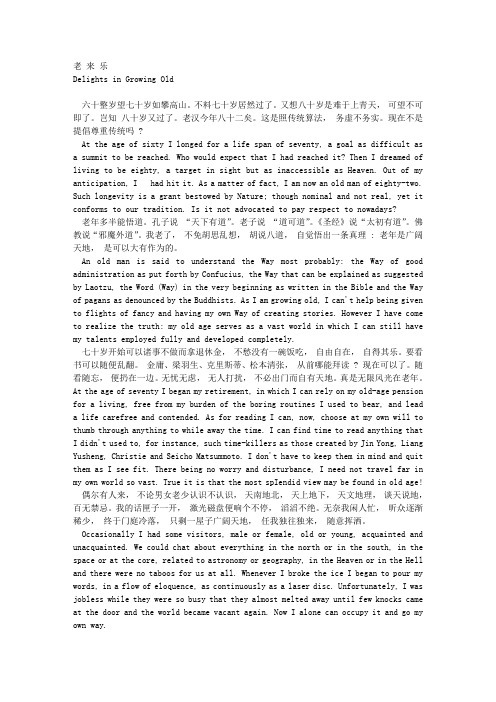
老来乐Delights in Growing Old六十整岁望七十岁如攀高山。
不料七十岁居然过了。
又想八十岁是难于上青天,可望不可即了。
岂知八十岁又过了。
老汉今年八十二矣。
这是照传统算法,务虚不务实。
现在不是提倡尊重传统吗 ?At the age of sixty I longed for a life span of seventy, a goal as difficult as a summit to be reached. Who would expect that I had reached it? Then I dreamed of living to be eighty, a target in sight but as inaccessible as Heaven. Out of my anticipation, I had hit it. As a matter of fact, I am now an old man of eighty-two. Such longevity is a grant bestowed by Nature; though nominal and not real, yet it conforms to our tradition. Is it not advocated to pay respect to nowadays?老年多半能悟道。
孔子说“天下有道”。
老子说“道可道”。
《圣经》说“太初有道”。
佛教说“邪魔外道”。
我老了,不免胡思乱想,胡说八道,自觉悟出一条真理 : 老年是广阔天地,是可以大有作为的。
An old man is said to understand the Way most probably: the Way of good administration as put forth by Confucius, the Way that can be explained as suggested by Laotzu, the Word (Way) in the very beginning as written in the Bible and the Way of pagans as denounced by the Buddhists. As I am growing old, I can't help being given to flights of fancy and having my own Way of creating stories. However I have come to realize the truth: my old age serves as a vast world in which I can still have my talents employed fully and developed completely.七十岁开始可以诸事不做而拿退休金,不愁没有一碗饭吃,自由自在,自得其乐。
“韩素音青年翻译奖”竞赛汉译英之体感
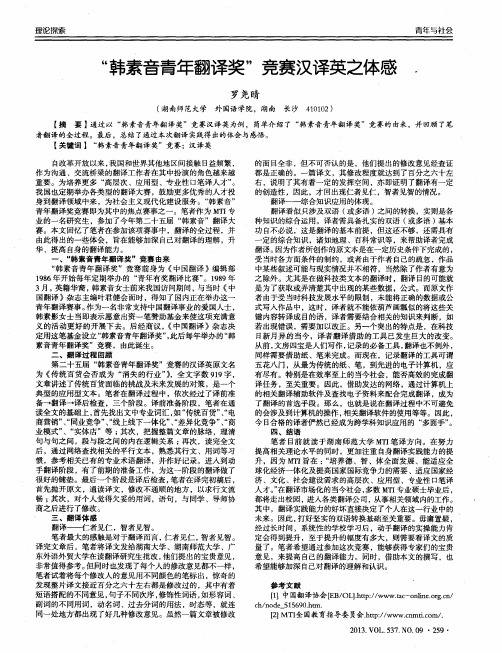
【 关键 词 】 “ 韩素音青年翻译 奖”竞赛 ;汉译英
自改革 开放以来 , 我 国和世界其他地 区间接触 日益频繁 , 作为沟通 、交 流桥梁的翻译工作者在其 中扮演 的角色越来越 重要 。为培养更 多 “ 高层次 、应用型 、专业性 口笔译 人才” 。 我 国也定期举办 各类 型的翻译大赛 ,鼓励更 多优 秀的人才投 身到翻译领域 中来 ,为社会主义现代化建设 服务 。“ 韩素音 ” 青年翻译奖竞赛 即为其 中的焦点赛 事之 一。笔者作为 M T I 专 业 的一名研究 生 ,参加了今年第二十五届 “ 韩 素音”翻译大 赛 。本文 回忆 了笔者 在参 加该项赛事 中 ,翻译 的全过程 ,并 由此得 出的一些 体会 ,旨在能够加深 自己对 翻译 的理解 ,升 华 、提高 自身 的翻泽能力 。 “ 韩素 音青年翻译奖”竞赛 由来 “ 韩 素音青年 翻译奖 ”竞赛前 身为 《 中国翻译 》编辑 部 1 9 8 6年 开始每年定期举办 的 “ 青 年有奖翻译 比赛 ” 。1 9 8 9年 3月 , 英籍华裔 , 韩 素音 女士前来 我国访 问期间 , 与 当时 《 中 国翻译 》杂 志主编叶君健会面 时 ,得 知了国 内正在举办这一 青年翻译赛事 。 作为一名非常支持 中国翻译事业 的爱 国人士 , 韩素影女 士当即表示 愿意 出资一笔赞助 基金来 使这项充满意 义 的活动更好 的开展 下去 。后 经商议 , 《中国翻译 》杂 志决 定用这笔基金设立 “ 韩素音青年翻译奖” , 此后每年举办的 “ 韩 素音青年翻译奖 ”竞赛 ,由此诞生 。
一
、
二 、 翻 译 过 程 回 顾
第二十五届 “ 韩素音青年 翻译 奖”竞赛 的汉译英原文名 为《 传 统百货 会否成 为 “ 消 失的行业 ” 》 ,全 文字数 9 1 9 字, 文章讲述 了传统 百货面临 的挑 战及未来 发展 的对策 ,是一个 典型 的应用 型文本。笔者在翻译过程 中 ,依 次经过了译前准 备一翻译—译 后检查 ,三个 阶段 。译前 准备 阶段 ,笔者在通 读全文 的基础上 , 首先找 出文 中专业词汇 , 如“ 传统百货 ” 、 “ 电 商营销 ” 、 “ 同业竞争 ” 、 “ 线上线下一体化 ” 、 “ 差异化竞争 ” 、 “ 商 业模式 ” 、“ 实体 店”等 ; 其次 ,把握整篇 文章的脉络 ,理清 句与句之 间 ,段 与段之间的 内在逻辑关 系 ; 再次 ,读完全文 后 ,通过 网络查 找相关的平行文本 ,熟悉其行 文 、用词等习 惯 ,参考相关 已有 的专业术语 翻译 ,并作好 记录。进 入到动 手翻译 阶段 , 有 了前 期的准备工作 , 为这一 阶段 的翻译做 了 很好的铺垫 。最后一个 阶段是译后检查 , 笔者在译完初稿后 , 首先抛开原 文 ,通读译文 ,修改不通顺 的地方 ,以求行文流 畅; 其次 ,对个人觉 得欠妥的用词 ,语句 ,与同学 、导师协 商之后进行 了修改 。 三、翻译体感 翻译— —仁者见仁 ,智者见智 。 笔 者最大的感触是对于翻译而言 , 仁者见仁 , 智者见智 。 译完文章后 ,笔者将译文发给湖南大学 、湖南师 范大学 、广 东外语外贸大学在读 翻译研究生批改 , 他们提 出的宝贵 意见 , 非常值得参考 。 但 同时也发现 了每个人 的修改 意见都不 一样 , 笔者试着将 每个 修改人的意见用不 同颜 色的笔标 出 ,惊奇 的 发现整片译 文接 近百分之六十左右都是修 改过的 ,其 中有着 短语搭配 的不 同意见 , 句子不 同次序 , 修饰性词语 , 如形容词 、 副词 的不 同用词 ,动名词 、过去分词 的用法 ,时态等 ,就连 同一处地方都 出现了好几种修改意见 。虽然 一篇 文章被修改
网络时代的翻译能力与翻译技巧——以第23届“韩素音青年翻译奖”竞赛一等奖译文的生成为例
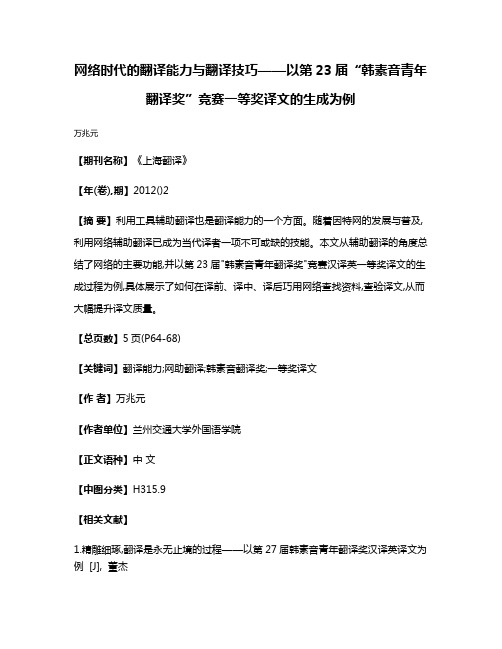
网络时代的翻译能力与翻译技巧——以第23届“韩素音青年翻译奖”竞赛一等奖译文的生成为例
万兆元
【期刊名称】《上海翻译》
【年(卷),期】2012()2
【摘要】利用工具辅助翻译也是翻译能力的一个方面。
随着因特网的发展与普及,利用网络辅助翻译已成为当代译者一项不可或缺的技能。
本文从辅助翻译的角度总结了网络的主要功能,并以第23届"韩素音青年翻译奖"竞赛汉译英一等奖译文的生成过程为例,具体展示了如何在译前、译中、译后巧用网络查找资料,查验译文,从而大幅提升译文质量。
【总页数】5页(P64-68)
【关键词】翻译能力;网助翻译;韩素音翻译奖;一等奖译文
【作者】万兆元
【作者单位】兰州交通大学外国语学院
【正文语种】中文
【中图分类】H315.9
【相关文献】
1.精雕细琢,翻译是永无止境的过程——以第27届韩素音青年翻译奖汉译英译文为例 [J], 董杰
2.英汉对比角度下的韩素音翻译比赛参考译文r——以第5届韩素音青年翻译奖竞赛英译"How Should OnerRead a Book?"为例 [J], 寇莹莹
3.意象图式视角下的散文翻译r——以2015年韩素音青年翻译奖竞赛英译汉为例[J], 周婉伊;万丽
4.基于语料库的翻译文体评估——以第28届“韩素音青年翻译奖”汉译英翻译为例 [J], 朱一凡;陶庆;郭鸿杰
5.译前准备与翻译语境化对汉译英质量的影响
——以第二十八届韩素音青年翻译奖竞赛汉译英为例 [J], 刘潇
因版权原因,仅展示原文概要,查看原文内容请购买。
韩素音青年翻译奖竞赛CATTI杯
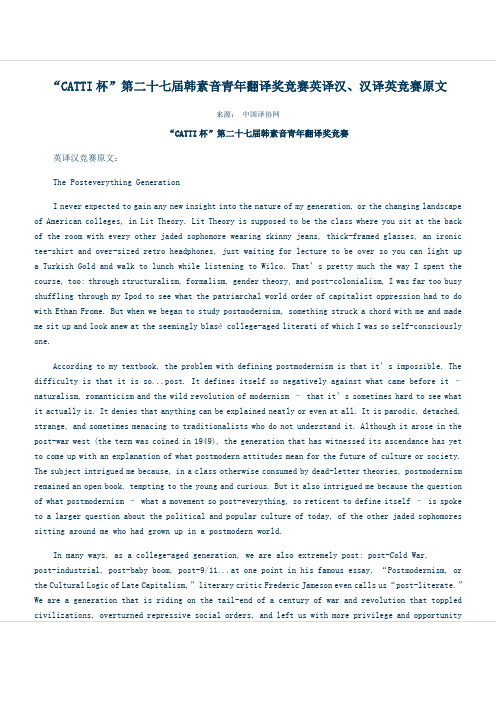
“CATTI杯”第二十七届韩素音青年翻译奖竞赛英译汉、汉译英竞赛原文来源:中国译协网“CATTI杯”第二十七届韩素音青年翻译奖竞赛英译汉竞赛原文:The Posteverything GenerationI never expected to gain any new insight into the nature of my generation, or the changing landscape of American colleges, in Lit Theory. Lit Theory is supposed to be the class where you sit at the back of the room with every other jaded sophomore wearing skinny jeans, thick-framed glasses, an ironic tee-shirt and over-sized retro headphones, just waiting for lecture to be over so you can light up a Turkish Gold and walk to lunch while listening to Wilco. That’s pretty much the way I spent the course, too: through structuralism, formalism, gender theory, and post-colonialism, I was far too busy shuffling through my Ipod to see what the patriarchal world order of capitalist oppression had to do with Ethan Frome. But when we began to study postmodernism, something struck a chord with me and made me sit up and look anew at the seemingly blasé college-aged literati of which I was so self-consciously one.According to my textbook, the problem with defining postmodernism is that it’s impossible. The difficulty is that it is so...post. It defines itself so negatively against what came before it –naturalism, romanticism and the wild revolution of modernism – that it’s sometimes hard to see what it actually is. It denies that anything can be explained neatly or even at all. It is parodic, detached, strange, and sometimes menacing to traditionalists who do not understand it. Although it arose in the post-war west (the term was coined in 1949), the generation that has witnessed its ascendance has yet to come up with an explanation of what postmodern attitudes mean for the future of culture or society. The subject intrigued me because, in a class otherwise consumed by dead-letter theories, postmodernism remained an open book, tempting to the young and curious. But it also intrigued me because the question of what postmodernism – what a movement so post-everything, so reticent to define itself – is spoke to a larger question about the political and popular culture of today, of the other jaded sophomores sitting around me who had grown up in a postmodern world.In many ways, as a college-aged generation, we are also extremely post: post-Cold War,post-industrial, post-baby boom, post-9/11...at one point in his famous essay, “Postmodernism, or the Cultural Logic of Late Capitalism,” literary critic Frederic Jameson even calls us “post-literate.”We are a generation that is riding on the tail-end of a century of war and revolution that toppled civilizations, overturned repressive social orders, and left us with more privilege and opportunitythan any other society in history. Ours could be an era to accomplish anything.And yet do we take to the streets and the airwaves and say “here we are, and this is what we demand”? Do we plant our flag of youthful rebellion on the mall in Washington and say “we are not leaving until we see change! Our eyes have been opened by our education and our conception of what is possible has been expanded by our privilege and we demand a better world because it is our right”? It would seem we do the opposite. We go to war without so much as questioning the rationale, we sign away our civil liberties, we say nothing when the Supreme Court uses Brown v. Board of Education to outlaw desegregation, and we sit back to watch the carnage on the evening news.On campus, we sign petitions, join organizations, put our names on mailing lists, make small-money contributions, volunteer a spare hour to tutor, and sport an entire wardrobe’s worth of Live Strong bracelets advertising our moderately priced opposition to everything from breast cancer to global warming. But what do we really stand for? Like a true postmodern generation we refuse to weave together an overarching narrative to our own political consciousness, to present a cast of inspirational or revolutionary characters on our public stage, or to define a specific philosophy. We are a story seemingly without direction or theme, structure or meaning – a generation defined negatively against what came before us. When Al Gore once said “It’s the combination of narcissism and nihilism that really defines postmodernism,” he might as well have been echoing his entire generation’s critique of our own. We are a generation for whom even revolution seems trite, and therefore as fair a target for bland imitation as anything else. We are the generation of the Che Geuvera tee-shirt.Jameson calls it “Pastiche”–“the wearing of a linguistic mask, speech in a dead language.”In literature, this means an author speaking in a style that is not his own – borrowing a voice and continuing to use it until the words lose all meaning and the chaos that is real life sets in. It is an imitation of an imitation, something that has been re-envisioned so many times the original model is no longer relevant or recognizable. It is mass-produced individualism, anticipated revolution. It is why postmodernism lacks cohesion, why it seems to lack purpose or direction. For us, thepost-everything generation, pastiche is the use and reuse of the old clichés of social change and moral outrage – a perfunctory rebelliousness that has culminated in the age of rapidly multiplyingnon-profits and relief funds. We live our lives in masks and speak our minds in a dead language –the language of a society that expects us to agitate because that’s what young people do. But how do we rebel against a generation that is expecting, anticipating, nostalgic for revolution?How do we rebel against parents that sometimes seem to want revolution more than we do? We don’t. We rebel by not rebelling. We wear the defunct masks of protest and moral outrage, but the real energy in campus activism is on the internet, with websites like . It is in the rapidly developing ability to communicate ideas and frustration in chatrooms instead of on the streets, and channel them into nationwide projects striving earnestly for moderate and peaceful change: we are thegeneration of Students Taking Action Now Darfur; we are the Rock the Vote generation; the generation of letter-writing campaigns and public interest lobbies; the alternative energy generation.College as America once knew it – as an incubator of radical social change – is coming to an end. To our generation the word “radicalism” evokes images of al Qaeda, not the Weathermen. “Campus takeover” sounds more like Virginia Tech in 2007 than Columbia University in 1968. Such phrases are a dead language to us. They are vocabulary from another era that does not reflect the realities of today. However, the technological revolution, the revolution, the revolution of the organization kid, is just as real and just as profound as the revolution of the 1960’s – it is just not as visible. It is a work in progress, but it is there. Perhaps when our parents finally stop pointing out the things that we are not, the stories that we do not write, they will see the threads of our narrative begin to come together; they will see that behind our pastiche, the post generation speaks in a language that does make sense. We are writing a revolution. We are just putting it in our own words.汉译英竞赛原文:保护古村落就是保护“根性文化”传统村落是指拥有物质形态和非物质形态文化遗产,具有较高的历史、文化、科学、艺术、社会、经济价值的村落。
第二十二届韩素音青年翻译奖竟赛英译汉译文和译文评析

英译汉Hidden Within Technology’s Empire, a Republic of Letters隐藏于技术帝国的文学界索尔•贝妻When I was a boy “discovering literature”, I used to think how wonderful it would be if every other person on the street were familiar with Proust and Joyce or T. E. Lawrence or Pasternak and Kafka. Later I learned how refractory to high culture the democratic masses were. Lincoln as a young frontiersman read Plutarch, Shakespeare and the Bible. But then he was Lincoln.我还是个"探索文学"的少年时,就经常在想:要是大街上人人都熟悉普鲁斯特和乔伊斯,熟悉T.E.劳伦斯,熟悉帕斯捷尔纳克和卡夫卡,该有多好啊!后来才知道,平民百姓对高雅文化有多排斥。
虽说少年时代身居边陲的林肯就在阅读普鲁塔克,、莎士比亚和《圣经》,但他毕竟是林肯。
Later when I was traveling in the Midwest by car, bus and train, I regularly visited small-town libraries and found that readers in Keokuk, Iowa, or Benton Harbor, Mich., were checking out Proust and Joyce and even Svevo and Andrei Biely. D. H. Lawrence was also a favorite. And sometimes I remembered that God was willing to spare Sodom for the sake of 10 of the righteous. Not that Keokuk was anything like wicked Sodom, or that Proust’s Charlus would have been tempted to settle in Benton Harbor, Mich. I seem to have had a persistent democratic desire to find evidences of high culture in the most unlikely places.后来,我坐小车、巴士和火车在中西部旅行,经常走访小镇图书馆;发现在衣阿华州基奥卡克市,或者密歇根州本顿港市,读者们借阅普鲁斯特和乔伊斯的作品,甚至还有斯维沃@和安德烈•别雷®的著作。
韩素音青年翻译奖竞赛原文

韩素音青年翻译奖竞赛原文第二十六届“韩素音青年翻译奖”竞赛原文英译汉竞赛原文:How the News Got Less MeanThe most read article of all time on BuzzFeed contains no photographs of celebrity nip slips and no inflammatory ranting. It’s a series of photos called “21 pictures that will restore your faith in humanity,”which has pulled in nearly 14 million visits so far. At Upworthy too, hope is the major draw. “This kid just died. What he left behind is wondtacular,”an Upworthy post about a terminally ill teen singer, earned 15 million views this summer and has raised more than $300,000 for cancer research.The recipe for attracting visitors to stories online is changing. Bloggers have traditionally turned to sarcasm and snark to draw attention. But the success of sites like BuzzFeed and Upworthy, whose philosophies embrace the viral nature of upbeat stories, hints that the Web craves positivity.The reason: social media. Researchers are discovering that people want to create positive images of themselves online by sharing upbeat stories. And with more people turning to Facebook and Twitter to find out what’s happening in the world, news stories may need to cheer up inorder to court an audience. If social is the future of media, then optimistic stories might be media’s future.“When we started, the prevailing wisdom was that snark ruled the Internet,”says Eli Pariser, a co-founder of Upworthy. “And we just had a really different sense of what works.”“You don’t want to be that guy at the party who’s crazy and angry and ranting in the corner —it’s the same for Twitteror Facebook,”he says. “Part of what we’re trying to d o with Upworthy is give people the tools to express a conscientious, thoughtful and positive identity in social media.”And the science appears to support Pariser’s philosophy. In a recent study from the Massachusetts Institute of Technology, researchers f ound that “up votes,”showing that a visitor liked a comment or story, begat more up votes on comments on the site, but “down votes”did not do the same. In fact, a single up vote increased the likelihood that someone else would like a comment by 32%, wherea s a down vote had no effect. People don’t want to support the cranky commenter, the critic or the troll. Nor do they want to be that negative personality online.In another study published in 2012, Jonah Berger, author of Contagious: Why Things Catch On and professor of marketing at the Wharton School of the University of Pennsylvania, monitored the most e-mailed stories produced by the New York Times for six months andfound that positive stories were more likely to make the list than negative ones.“What we share [or like] is almost like the car we drive or the clothes we wear,”he says. “It says something about us to other people. So people would much rather be seen as a Positive Polly than a Debbie Downer.”It’s not always that simple: Berger says that th ough positive pieces drew more traffic than negative ones, within the categories of positive and negative stories, those articles that elicited more emotion always led to more shares.“Take two negative emotions, for example: anger and sadness,”Berger says. “Both of those emotions would make the reader feel bad. But anger, a high arousal emotion, leads to moresharing, whereas sadness, a low arousal emotion, doesn’t. The same is true of the positive side: excitement and humor increase sharing, whereas conte ntment decreases sharing.”And while some popular BuzzFeed posts —like the recent “Is this the most embarrassing interview Fox News has ever done?”—might do their best to elicit shares through anger, both BuzzFeed and Upworthy recognize that their main success lies in creating positive viral material.“It’s not that people don’t share negative stories,”says Jack Shepherd, editorial director at BuzzFeed. “It just means that there’s ahigher potential for positive stories to do well.”Upworthy’s mission is to highlight serious issues but in a hopeful way, encouraging readers to donate money, join organizations and take action. The strategy seems to be working: barely two years after its launch date (in March 2012), the site now boasts 30 million unique visitors per month, according to Upworthy. The site’s average monthly unique visitors grew to 14 million people over its first six quarters —to put that in perspective, the Huffington Post had only about 2 million visitors in its first six quarters online.But Upworthy measures the success of a story not just by hits. The creators of the site only consider a post a success if it’s also shared frequently on social media. “We are interested in content that people want to share partly for pragmatic reasons,”Pariser s ays. “If you don’t have a good theory about how to appear in Facebook and Twitter, then you may disappear.”Nobody has mastered the ability to make a story go viral like BuzzFeed. The site, which began in 2006 as a lab to figure out what people share onlin e, has used what it’s learned to draw 60million monthly unique visitors, according to BuzzFeed. (Most of that traffic comes from social-networking sites, driving readers toward BuzzFeed’s mix of cute animal photos and hard news.) By comparison the New York Times website, one of the most popular newspaper sites on the Web,courts only 29 million unique visitors each month, according to the Times.BuzzFeed editors have found that people do still read negative or critical stories, they just aren’t the posts t hey share with their friends. And those shareable posts are the ones that newsrooms increasingly prize.“Anecdotally, I can tell you people are just as likely to click on negative stories as they are to click on positive ones,”says Shepherd. “But they’re m ore likely to share positive stories. What you’re interested in is different from what you want your friends to see what you’re interested in.”So as newsrooms re-evaluate how they can draw readers and elicit more shares on Twitter and Facebook, they may look to BuzzFeed’s and Upworthy’s happiness model for direction.“I think that the Web is only becoming more social,”Shepherd says. “We’re at a point where readers are your publishers. If news sites aren’t thinking about what it would mean for someone to share a story on social media, that could be detrimental.”汉译英竞赛原文:城市的迷失沿着瑗珲—腾冲线,这条1935年由胡焕庸先生发现并命名的中国人口、自然和历史地理的分界线,我们看到,从远距离贸易发展开始的那天起,利益和权力的渗透与分散,已经从根本结构上改变了城市的状态:城市在膨胀,人在疏离。
韩素音国际翻译大赛

韩素音国际翻译大赛
韩素音国际翻译大赛是一个为全球的翻译爱好者提供展
示自己才华的舞台的盛会。
每年举办一次的翻译大赛吸引了来自世界各地的参赛者。
本次比赛的主题是全球文化交流与理解,旨在促进不同语言和文化之间的沟通和相互理解。
参赛者们通过翻译文本来展示他们的语言水平和跨文化交流能力。
为了确保公平而严谨的比赛环境,本次翻译大赛的评委
团队由多位翻译专家和语言学者组成。
他们严格按照翻译准确性、语言流畅性和表达准确性等标准进行评判,并在评选出优秀翻译作品时兼顾对源文本的理解和对目标语言文化的传达。
通过这样的评判标准,能够确保最终评选出的优胜者在翻译的准确性和质量上都能够得到充分的体现。
对于参赛者而言,韩素音国际翻译大赛既是展示自己翻
译技巧的机会,也是一个学习和交流的平台。
通过与其他参赛者的互动,他们可以了解到来自不同文化背景下的翻译方法和技巧,拓宽自己的视野并提升自己的翻译能力。
同时,参赛者们也能够从评委和其他专业人士的评语和建议中获益,不断完善自己的翻译技巧和知识储备。
此外,韩素音国际翻译大赛还设立了多个奖项,包括最
佳译文奖、最佳口译奖、最佳创意翻译奖等。
这些奖项的设立既是对参赛者们努力和才华的肯定,也是对他们继续学习和进步的鼓励。
获奖者将有机会得到一系列奖品和奖金,并在翻译界获得更多的认可和机会。
韩素音国际翻译大赛的举办不仅有助于促进不同语言和
文化之间的交流和理解,也为翻译专业人士和翻译爱好者提供了一个展示自己才华的平台。
通过这个比赛,我们相信翻译能力和跨文化交流能力将得到更大的关注和重视,为全球文化交流和发展做出更积极的贡献。
第二十五届韩素英翻译大赛原文
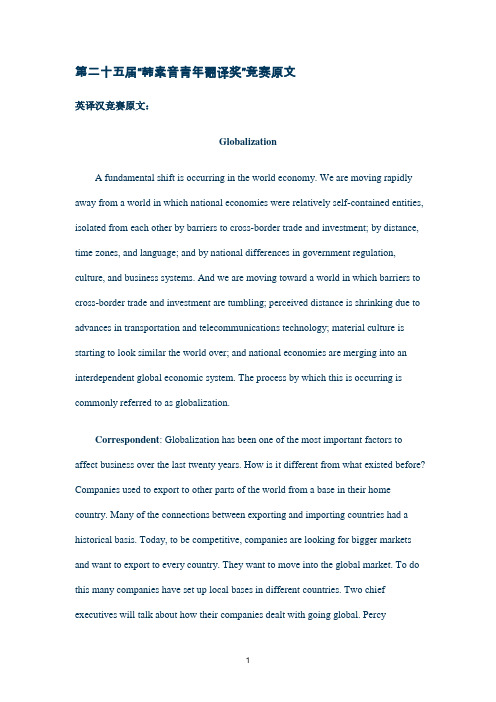
第二十五届“韩素音青年翻译奖”竞赛原文英译汉竞赛原文:GlobalizationA fundamental shift is occurring in the world economy. We are moving rapidly away from a world in which national economies were relatively self-contained entities, isolated from each other by barriers to cross-border trade and investment; by distance, time zones, and language; and by national differences in government regulation, culture, and business systems. And we are moving toward a world in which barriers to cross-border trade and investment are tumbling; perceived distance is shrinking due to advances in transportation and telecommunications technology; material culture is starting to look similar the world over; and national economies are merging into an interdependent global economic system. The process by which this is occurring is commonly referred to as globalization.Correspondent: Globalization has been one of the most important factors to affect business over the last twenty years. How is it different from what existed before? Companies used to export to other parts of the world from a base in their home country. Many of the connections between exporting and importing countries had a historical basis. Today, to be competitive, companies are looking for bigger markets and want to export to every country. They want to move into the global market. To do this many companies have set up local bases in different countries. Two chief executives will talk about how their companies dealt with going global. PercyBarnevik, one of the world’s most admired business leaders when he was Chairman of the international engineering group ABB and Dick Brown of telecommunications provider Cable & Wireless.Cable & Wireless already operates in many countries and is well-placed to take advantage of the increasingly global market for telecommunications. For Dick Brown globalization involves the economies of countries being connected to each other and companies doing business in many countries and therefore having multinational accounts.Dick Brown: The world is globalizing and the telecommunications industry is becoming more and more global, and so we feel we’re well-positioned in that market place. You see currency markets are more global tied, economies are globally connected, more so nowadays with expanded trade, more and more multinational accounts are doing business in many, many more countries. We’re a company at Cable & Wireless now, well-positioned to carry the traffic and to provide the services to more and more companies that now need to get to five countries or twelvec ountries, we’re often there.Correspondent: When Percy Barnevik became head of the international engineering group ABB, his task was to make globalization work. He decided to divide the business into over a thousand smaller companies. In this way he believed the company could be both global and local. In answering the question “How do you make globalization work?”, Percy Barnevik describes the “global glue” that keeps themany different people in ABB together. He then looks at the need to manage the three contradictions of company: it is decentralized but centrally controlled, it is big and small at the same time and it is both global and local.Percy Barnevik: We have now for ten years after our big merger created a “global glue” where people are tied together, where they don’t internally compete, but support each other, and you have global leaders with global responsibility and your local managers working with their profit centers, and if you have the right, so to say, agenda for these people and the right structure, you can use a scale of economy and your advantages of bigness but being small. We used to say you have three contradictions: decentralized and still centrally controlled, big and small, global and local, and, of course, to try to make these contradictions work together effectively, then I think you have a big organizational competitive edge.Correspondent: Globalizations can bring advantage to a business, but how does a company go global? Dick Brown mentions three ways companies can achieve “globalness”. Firstly, companies can work together in alliances. Secondly, they can acquire or buy other companies, and thirdly they can grow organically by expanding from their existing base.Dick Brown: Well, as you go global, and a handful or more of companies are going to really push out, in my view, to be truly global companies, and some of them, maybe all of them, will also work to be local. They’ll be local in chosen markets and global in their ability to carry their customers’ needs from continent A to c ontinent B.We want to be one of the companies that’s both global and local. Alliances are one way to be global, it’s not the only way to be global; you can acquire your way to “globalness”, you can organically grow your way to “globalness”, you can have alliances which help you get global quicker, so you take your pick.Percy Barnevik: You have to start from the top with local people who understand language, culture and so on, and I think in this global world where the East is coming up now, that’s a winni ng recipe.Correspondent: ABB already found the winning recipe. Its theory of globalization has become the company’s working practice. So how do you make theory work in practice? Percy Barnevik believes that successful globalization involves getting people to work together, overcoming national, cultural barriers and making the organization customer-driven.Percy Barnevik: You see the easy thing is to have the theory, but then to make the systems work, to make people really work together, to trust each other —Americans, Europeans, Asians, to get over these national cultural barriers and create a common glue, ABB, and then make them customer-driven. If you can achieve that, and create that culture deep down then I think you have an important competitive edge.Correspondent: What Dick Brown and Percy Barnevik have shown is that there are different routes to globalization and that companies have to work hard to succeed in going global. Actually one of the disadvantages of the Global Strategy is thatintegrated competitive moves can lead to the sacrificing of revenues, profits, or competitive positions in individual countries — especially when the subsidiary in one country is told to attack a global competitor in order to convey a signal or divert that competitor’s resources from another nation. The challenges managers of transnational corporations face are to identify and exploit cross-border synergies and to balance local demands with the global vision for the corporation. Building an effective transnational organization requires a corporate culture that values global dissimilarities across cultures and markets.汉译英竞赛原文:传统百货会否成为“消失的行业”数据显示,2011年中国电子商务市场整体交易规模达到7万亿元,同比增长46.4%。
第28届韩素音翻译比赛汉译英原文和参考译文(下)
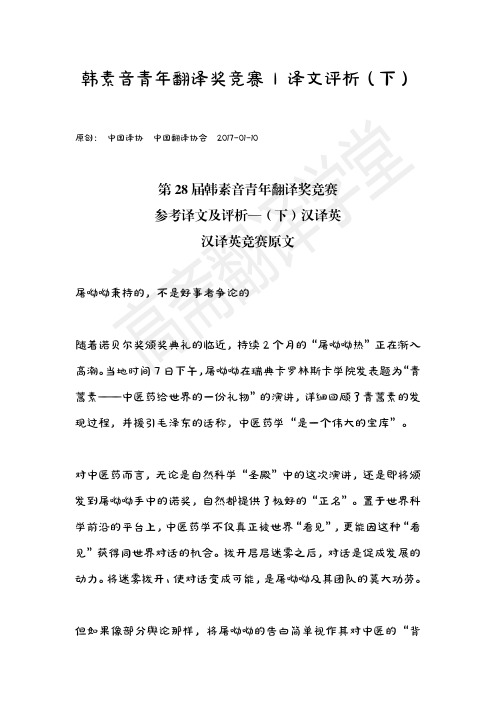
韩素音青年翻译奖竞赛 | 译文评析(下) 原创: 中国译协 中国翻译协会 2017-01-10第28届韩素音青年翻译奖竞赛参考译文及评析—(下)汉译英汉译英竞赛原文屠呦呦秉持的,不是好事者争论的随着诺贝尔奖颁奖典礼的临近,持续2个月的“屠呦呦热”正在渐入高潮。
当地时间7日下午,屠呦呦在瑞典卡罗林斯卡学院发表题为“青蒿素——中医药给世界的一份礼物”的演讲,详细回顾了青蒿素的发现过程,并援引毛泽东的话称,中医药学“是一个伟大的宝库”。
对中医药而言,无论是自然科学“圣殿”中的这次演讲,还是即将颁发到屠呦呦手中的诺奖,自然都提供了极好的“正名”。
置于世界科学前沿的平台上,中医药学不仅真正被世界“看见”,更能因这种“看见”获得同世界对话的机会。
拨开层层迷雾之后,对话是促成发展的动力。
将迷雾拨开、使对话变成可能,是屠呦呦及其团队的莫大功劳。
但如果像部分舆论那样,将屠呦呦的告白简单视作其对中医的“背书”,乃至将其成就视作中医向西医下的“战书”,这样的心愿固然可嘉,却可能完全背离科学家的本意。
听过屠呦呦的报告,或是对其研究略作了解就知道,青蒿素的发现既来自于中医药“宝库”提供的积淀和灵感,也来自于西医严格的实验方法。
缺了其中任意一项,历史很可能转向截然不同的方向。
换言之,在“诺奖级”平台上促成中西医对话之前,屠呦呦及其团队的成果,正是长期“对话”的成果。
而此前绵延不绝的“中西医”之争,多多少少都游离了对话的本意,而陷于一种单向化的“争短长”。
持中医论者,不屑于西医的“按部就班”;持西医论者,不屑于中医的“随心所欲”。
双方都没有看到,“按部就班”背后本是实证依据,“随心所欲”背后则有文化内涵,两者完全可以兼容互补,何必非得二元对立?屠呦呦在演讲中坦言,“通过抗疟药青蒿素的研究历程,我深深地感到中西医药各有所长,两者有机结合,优势互补,当具有更大的开发潜力和良好的发展前景”。
这既是站在中医药立场上对西方科学界的一次告白,反过来也可理解为西医立场上对中医拥趸们的提醒。
第十二届“韩素音青年翻译奖”竞赛原文及参考译文(汉译英)
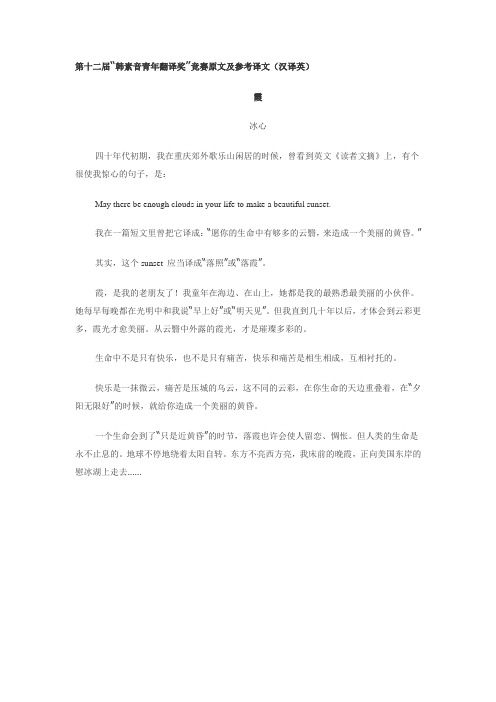
第十二届“韩素音青年翻译奖”竞赛原文及参考译文(汉译英)霞冰心四十年代初期,我在重庆郊外歌乐山闲居的时候,曾看到英文《读者文摘》上,有个很使我惊心的句子,是:May there be enough clouds in your life to make a beautiful sunset.我在一篇短文里曾把它译成:“愿你的生命中有够多的云翳,来造成一个美丽的黄昏。
”其实,这个sunset 应当译成“落照”或“落霞”。
霞,是我的老朋友了!我童年在海边、在山上,她都是我的最熟悉最美丽的小伙伴。
她每早每晚都在光明中和我说“早上好”或“明天见”。
但我直到几十年以后,才体会到云彩更多,霞光才愈美丽。
从云翳中外露的霞光,才是璀璨多彩的。
生命中不是只有快乐,也不是只有痛苦,快乐和痛苦是相生相成,互相衬托的。
快乐是一抹微云,痛苦是压城的乌云,这不同的云彩,在你生命的天边重叠着,在“夕阳无限好”的时候,就给你造成一个美丽的黄昏。
一个生命会到了“只是近黄昏”的时节,落霞也许会使人留恋、惆怅。
但人类的生命是永不止息的。
地球不停地绕着太阳自转。
东方不亮西方亮,我床前的晚霞,正向美国东岸的慰冰湖上走去……The Rosy CloudBingxinDuring the early 1940s I was living a retired life in the Gele Mountains in the suburbs of Chongqing (Chungking). One day, while reading the English language magazine Reader's Digest I found a sentence that touched me greatly. It read: "May there be enough clouds in your life to make a beautiful sunset."In a short article of mine, I quoted this sentence and translated it as "Yuan ni de shengming zhong you guo duo de yunyi, lai zaocheng yige meili de huanghun. " (literally: May there be enough clouds in your life to make a beautiful sunset.) *As I see it now, the word "sunset" in the English sentence should have been translated as luozhao (the glow at sunset) or luoxia (the rosy cloud at sunset), instead of dusk.She has been my dear old friend, the Rosy Cloud! She was my closest and most beautiful little companion when, in my childhood, I played on the beach or in the hills. Bathed in the brilliant sunshine, she would say to me "Good morning!" at dawn and "See you tomorrow!" at dusk. But not until several decades later did I come to realize that the more clouds there are the more beautiful the rays of sunlight will be, and the glow of the sun breaking through the clouds becomes most resplendent and colorful.Life contains neither unalloyed happiness nor mere misery. Happiness and misery beget, complement and set off each other.Happiness is a wisp of fleecy cloud; misery a mass of threatening dark cloud. These different clouds overlap on the horizon of your life to create a beautiful dusk for you when "the setting sun is most lovely indeed."**An individual's life must inevitably reach the point when "dusk is so near,"*** and the rosy sunset cloud may make one nostalgic and melancholy. But human life goes on and on. The Earth ceaselessly rotates on its axis around the sun. When it is dark in the east, it is light in the west. The rosy sunset cloud is now sailing past my window towards Lake Waban on the east coast of America ...*This sentence appears in Chinese and English in the article "For Young Readers Again, Newsletter No.4", written by Bing Xin in the Gele Mountains, on December 1, 1944.** and *** These two poetic lines are taken from a poem "On the Plain of Tombs" by Li Shangyin (813-858), a well-known poet of the Tang Dynasty (618-907). The two lines read like this: "The setting sun appears sublime, / But O! 'Tis near its dying time." (Tr. Xu Yuanchong) They imply that the setting sun has infinite beauty, but it is a pity that it is near the dusk, and the beautiful scene cannot last long. The two lines are often used to deplore the ephemeral nature of things, and to express the feelings at the loss of past glory and at the advent of old age.。
外国语学院(学院代码005)

外国语学院(学院代码:005)>>外国语学院概况中国民用航空飞行学院外国语学院是学校人文学科的中坚力量,是民航英语教学与研究的重要基地。
学院下设大学英语教研室、民航英语教研室、英语专业教研室、飞行基础英语教研室和ICAO英语教研室等五个教研室,建有民航英语研究所、民航国际教育研究所和同声传译实验室。
现有教职工90人,其中有海外留学经历的硕士及博士14人,具有高级职称的32人。
>>翻译硕士专业学位点翻译硕士专业学位点是中国民用航空飞行学院唯一人文学科硕士点。
学科点严格按照国务院学位委员会、教育部学位管理与研究生教育司、全国翻译专业学位研究生教育指导委员会等部门的要求进行建设。
学科点依托行业和学校优势,突出翻译硕士专业的民航特色。
翻译硕士点旨在培养具有良好的职业道德、掌握翻译基本理论与操作技能、熟练使用翻译工具、具有广博专业知识、适应民航、航空与区域经济建设需要,具有鲜明民航特色和职业导向的高层次、应用型、专业性口笔译人才,满足我国民航业以及本区域民航相关的运输、维修、制造、培训、管理等多个领域对专门化翻译人才、高级语言服务人才的需求。
>就业方向毕业生可在民航相关领域从事翻译及相关高级语言服务工作。
除此之外,毕业生可从事英语教学、人力资源、行政管理等工作。
>学位类型专业学位硕士研究生完成培养方案中规定的所有环节,成绩合格,达到培养方案规定的学分要求,符合学校相关规定的,可申请学位论文评审与答辩。
学位论文评审与答辩一般在硕士研究生入学后的第六学期进行。
学位论文评审与答辩按照依据《中国民航飞行学院硕士学位论文答辩及学位授予工作细则》和其他有关规定进行。
通过学位论文答辩,符合毕业条件颁发相应学科毕业证书。
达到本学科学位(授予)标准及其他有关要求,符合学位授予条件的,可依据《中国民航飞行学院硕士学位论文答辩及学位授予工作细则》审批,授予“翻译硕士”学位。
>>学科带头人黄德先,上海外国语大学翻译学博士,中国民用航空飞行学院教授,美国肯特州立大学访问学者。
韩素音翻译大赛英译汉原文解读与译赏(2020年7月整理).pdf

Globalization全球化颜林海【标题解读】写作分析:何谓全球化?回答这个问题的过程就是就是人类对客观事物的认识过程,即“定义”的过程,换句话说,“定义”就是界定一种事物的本质(即意义)的说明。
“定义”有许多方式,最常见的有:列举法(illustration),分类法(classification),过程分析法(process analysis),因果法(cause and effect),比对法(comparison and contrast);除了以上方法外,还有特征枚举法(enumerating characteristics),词源法(etymology),类比法(analogy),排除法(exclusion)(M.S. Spangler & R.Werner,1990:131—135)。
从写作或其他媒介的角度,作为一篇文章的标题,作者必然要围绕标题来展开,而要展开这个话题,就必须对该字词加以界定,即定义。
篇体分析:从上下文看,这是一篇由一档电视谈话节目转写而成的书面文档;电视访谈类节目虽然重在访谈,但并非人与人之间的私下闲聊,因此,节目主持人也往往会提前大致拟定一个围绕某一话题而展开的提纲,这就与文章写作大同而小异了。
理解与翻译时,注意访谈中人物对话的转换,还要注意书写文本在断句上与访谈情景有时并不一致,如(25)句。
翻译分析:在翻译之前,译者也应对标题中涉及到的概念加以认识和理解。
译者在分析某一核心字词时必须注意该字词的音形义的分析。
此篇文章中globalization与音没有多大关系,主要分析该字词的“形”和“义”。
而字“形”的分析涉及到该词的词源和构词方式。
词源分析:Globalization一词逆推词源关系如下:globalization。
构词分析:globalization不过是globalize的名词拼写形式,核心意义在globalize;而此词的构形属于英语中“形容词+动词后缀ize”构词法,其表达的意义为“使...‘形容词’化”或“使...变成‘形容词’”。
第二十四届 韩素音青年翻译奖竞赛译文
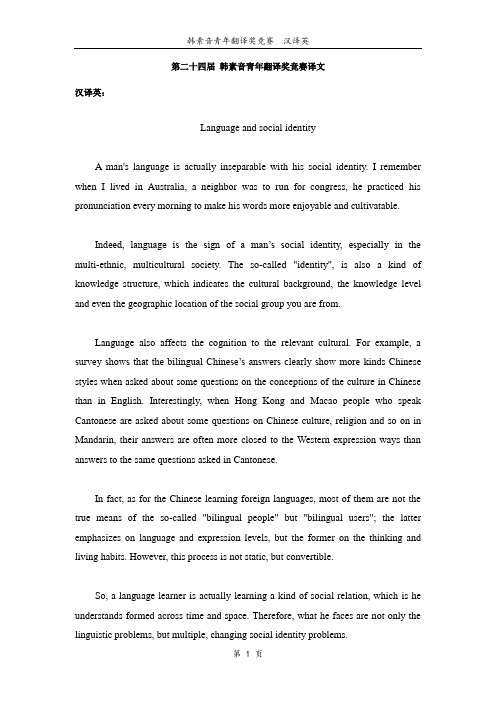
第二十四届韩素音青年翻译奖竞赛译文汉译英:Language and social identityA man's language is actually inseparable with his social identity. I remember when I lived in Australia, a neighbor was to run for congress, he practiced his pronunciation every morning to make his words more enjoyable and cultivatable.Indeed, language is the sign of a man’s social identity, especially in the multi-ethnic, multicultural society. The so-called "identity", is also a kind of knowledge structure, which indicates the cultural background, the knowledge level and even the geographic location of the social group you are from.Language also affects the cognition to the relevant cultural. For example, a survey shows that the bilingual Chinese’s answers clearly show more kinds Chinese styles when asked about some questions on the conceptions of the culture in Chinese than in English. Interestingly, when Hong Kong and Macao people who speak Cantonese are asked about some questions on Chinese culture, religion and so on in Mandarin, their answers are often more closed to the Western expression ways than answers to the same questions asked in Cantonese.In fact, as for the Chinese learning foreign languages, most of them are not the true means of the so-called "bilingual people" but "bilingual users"; the latter emphasizes on language and expression levels, but the former on the thinking and living habits. However, this process is not static, but convertible.So, a language learner is actually learning a kind of social relation, which is he understands formed across time and space. Therefore, what he faces are not only the linguistic problems, but multiple, changing social identity problems.Study also shows, a person’s language style is not fixed, but change with the social environment and the people he talks to. Generally speaking, individual language has a convergent tendency (i.e. follow the crowd), but sometimes also has a divergent tendency (i.e. show their own characteristics). For example, when I returned to Beijing, my “Beijing intonation"become strong clearly; but when my English friend was in Australia, his "British" was kept more obvious, I do not know if he was to show his identity purposely.In the process of adapting to foreign cultures, people’s attitudes towards their mother languages have a positive or negative choice. Some people who are actively involved in others’ mainstream cultures intend to weaken their ability of native language at the same time; however some people strengthen and highlight this ability considering it as an advantage.In g eneral, if a social group’s spoken and used language is respected by society (e.g. i n England, the noble’s language represented by the queen), will have higher social superiority, and its members will also show their difference in purpose to maintain its positive characteristics of the group. Of course, it’s inevitable that others draw close to the group’s language style.A person's language also can be an object of others’ judgment. According to a study, the social status, the education level, goodness or badness, intelligence, ability and even wealth can be judged from it.Thus, we can see clearly that the meaning of a person’s language. If the clothing is the body modification, language will be the external embodiment of a person’s comprehensive value. Therefore, language should not be only regarded as a tool, but a kind of quality.。
- 1、下载文档前请自行甄别文档内容的完整性,平台不提供额外的编辑、内容补充、找答案等附加服务。
- 2、"仅部分预览"的文档,不可在线预览部分如存在完整性等问题,可反馈申请退款(可完整预览的文档不适用该条件!)。
- 3、如文档侵犯您的权益,请联系客服反馈,我们会尽快为您处理(人工客服工作时间:9:00-18:30)。
“CATTI杯”第二十七届韩素音青年翻译奖竞赛英译汉、汉译英竞赛原文来源:中国译协网“CATTI杯”第二十七届韩素音青年翻译奖竞赛英译汉竞赛原文:The Posteverything GenerationI never expected to gain any new insight into the nature of my generation, or the changing landscape of American colleges, in Lit Theory. Lit Theory is supposed to be the class where you sit at the back of the room with every other jaded sophomore wearing skinny jeans, thick-framed glasses, an ironic tee-shirt and over-sized retro headphones, just waiting for lecture to be over so you can light up a Turkish Gold and walk to lunch while listening to Wilco. That’s pretty much the way I spent the course, too: through structuralism, formalism, gender theory, and post-colonialism, I was far too busy shuffling through my Ipod to see what the patriarchal world order of capitalist oppression had to do with Ethan Frome. But when we began to study postmodernism, something struck a chord with me and made me sit up and look anew at the seemingly blasé college-aged literati of which I was so self-consciously one.According to my textbook, the problem with defining postmodernism is that it’s impossible. The difficulty is that it is so...post. It defines itself so negatively against what came before it – naturalism, romanticism and the wild revolution of modernism –that it’s sometimes hard to see what it actually is. It denies that anything can be explained neatly or even at all. It is parodic, detached, strange, and sometimes menacing to traditionalists who do not understand it. Although it arose in the post-war west (the term was coined in 1949), the generation that has witnessed its ascendance has yet to come up with an explanation of what postmodern attitudes mean for the future of culture or society. The subject intrigued me because, in a class otherwise consumed by dead-letter theories, postmodernism remained an open book, tempting to the young and curious. But it also intrigued me because the question of what postmodernism – what a movement sopost-everything, so reticent to define itself – is spoke to a larger question about the political and popular culture of today, of the other jaded sophomores sitting around me who had grown up in a postmodern world.In many ways, as a college-aged generation, we are also extremely post: post-Cold War, post-industrial, post-baby boom, post-9/11...at one point in his famous essay, “Postmodernism, or the Cultural Logic of Late Capitalism,” literary critic Frederic Jameson even calls us “post-literate.” We are a generation that is riding on the tail-end of a century of war and revolution that toppled civilizations, overturned repressive social orders, and left us with more privilege and opportunity than any other society in history. Ours could be an era to accomplish anything.And yet do we take to the streets and the airwave s and say “here we are, and this is what we demand”? Do we plant our flag of youthful rebellion on the mall in Washington and say “we are not leaving until we see change! Our eyes have been opened by our education and our conception of what is possible has been expanded by our privilege and we demand a better world because it is our right”? It would seem we do the opposite. We go to war without so much as questioningthe rationale, we sign away our civil liberties, we say nothing when the Supreme Court uses Brown v. Board of Education to outlaw desegregation, and we sit back to watch the carnage on the evening news.On campus, we sign petitions, join organizations, put our names on mailing lists, make small-money contributions, volunteer a spare hour to tut or, and sport an entire wardrobe’s worth of Live Strong bracelets advertising our moderately priced opposition to everything from breast cancer to global warming. But what do we really stand for? Like a true postmodern generation we refuse to weave together an overarching narrative to our own political consciousness, to present a cast of inspirational or revolutionary characters on our public stage, or to define a specific philosophy. We are a story seemingly without direction or theme, structure or meaning – a generation defined negatively against what came before us. When Al Gore once said “It’s the combination of narcissism and nihilism that really defines postmodernism,” he might as well have been echoing his entire generation’s critique of our own. We a re a generation for whom even revolution seems trite, and therefore as fair a target for bland imitation as anything else. We are the generation of the Che Geuvera tee-shirt.Jameson calls it “Pastiche” –“the wearing of a linguistic mask, speech in a dead language.” In literature, this means an author speaking in a style that is not his own – borrowing a voice and continuing to use it until the words lose all meaning and the chaos that is real life sets in. It is an imitation of an imitation, something that has been re-envisioned so many times the original model is no longer relevant or recognizable. It is mass-produced individualism, anticipated revolution. It is why postmodernism lacks cohesion, why it seems to lack purpose or direction. For us, thepost-everything generation, pastiche is the use and reuse of the old clichés of social change and moral outrage – a perfunctory rebelliousness that has culminated in the age of rapidly multiplying non-profits and relief funds. We live our lives in masks and speak our minds in a dead language –the language of a society that expects us to agitate because that’s what young people do. But how do we rebel against a generation that is expecting, anticipating, nostalgic for revolution?How do we rebel against parent s that sometimes seem to want revolution more than we do? We don’t. We rebel by not rebelling. We wear the defunct masks of protest and moral outrage, but the real energy in campus activism is on the internet, with websites like . It is in the rapidly developing ability to communicate ideas and frustration in chatrooms instead of on the streets, and channel them into nationwide projects striving earnestly for moderate and peaceful change: we are the generation of Students Taking Action Now Darfur; we are the Rock the Vote generation; the generation of letter-writing campaigns and public interest lobbies; the alternative energy generation.College as America once knew it – as an incubator of radical social change – is coming to an end. To our generation the word “radicalism” evokes images of al Qaeda, not the Weathermen. “Campus takeover” sounds more like Virginia Tech in 2007 than Columbia University in 1968. Such phrases are a dead language to us. They are vocabulary from another era that does not reflect the realities of today. However, the technological revolution, the revolution, the revolution of the organization kid, is just as real and just as profound as the revolution of the 1960’s – it is just not as visible. It is a work in progress, but it is there. Perhaps when our parents finally stop pointing out the things that we are not, the stories that we do not write, they will see the threads of our narrative begin to come together; they will see that behind our pastiche, the post generation speaks in a language that does make sense. We are writing a revolution. We arejust putting it in our own words.。
